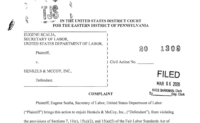Federal Contracting
Biden Directive Mandates $15 Minimum Wage for Federal Contracts
Contractor groups see little impact on construction wages

The new directive says: "Raising the minimum wage enhances worker productivity and generates higher-quality work by boosting workers' health, morale and effort; reducing absenteeism and turnover; and lowering supervisory and training costs."
Image courtesy of Pixabay
President Joe Biden has signed a directive requiring federal contractors, including those working on construction projects, to pay their workers a minimum wage of $15 per hour, beginning with new contracts and extensions next year.
[View the White House fact sheet here.]
But the Associated General Contractors of America and Associated Builders and Contractors see little impact on wages on federal construction projects from the executive order, which Biden signed on April 27.
That's because many such projects are subject to the Davis-Bacon Act's prevailing-wage requirements, which generally lead to hourly pay rates above $15.
Ben Brubeck, ABC's vice president of regulatory, labor and state affairs, said in an emailed statement, "The primary concern with this executive order is not the wage rate itself, but rather the unlawful and unprecedented power grab by the executive branch to set a new minimum wage in direct contravention of" the Davis-Bacon and Service Contract acts.
The executive order says that its requirements will apply to, among other things, any new "procurement contract or contract-like instrument for services or construction." It also would apply to new solicitations, extensions, contract renewals or options exercised on a contract. The provision takes effect on March 30, 2022.
In addition, the directive says the minimum wage will be indexed for inflation annually after 2022.
The new benchmark represents a 37% increase over the current minimum wage on federal contracts of $10.95 per hour.
For federal contract workers who also receive tips, the directive provides for a new hourly minimum cash wage of $10.50, up from $7.65 per hour now.
Brian Turmail, AGC spokesman, said in an emailed statement, “This executive order is likely to have little impact on construction contractors,” because, in part, of Davis-Bacon Act requirements. That law, enacted in 1931, applies to contracts valued at $2,000 or more and mandates paying wages at prevailing levels in the area where a project is located.
Turmail said, “In the relatively few parts of the country where the prevailing wage rates are below $15 an hour, it just means government estimators are going to have to account for, and pay for, more to complete projects than today.”
North America's Building Trades Unions did not respond immediately to ENR's request for comment.
The Biden administration sees a variety of benefits from the executive order. The directive says, "Raising the minimum wage enhances worker productivity and generates higher-quality work by boosting workers' health, morale and effort; reducing absenteeism and turnover; and lowering supervisory and training costs."
The directive also states that the Secretary of Labor is to issue implementing regulations for the new wage level by Nov. 24.



